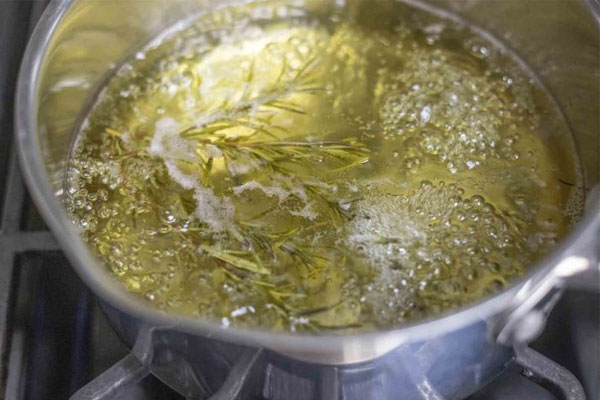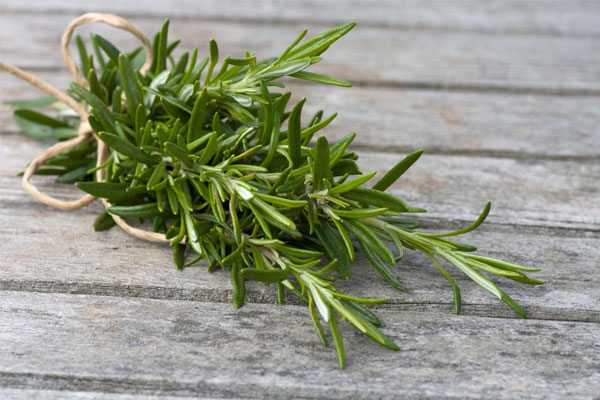Blogs
Does boiling rosemary destroy nutrients?
Rosemary is a well-known herb widely used in cooking, herbal teas, and natural remedies. With its strong aroma and distinct flavor, it enhances a variety of dishes while also offering numerous health benefits. Rich in antioxidants, vitamins, and minerals, rosemary is often praised for its potential to improve digestion, boost memory, and reduce inflammation.
However, when cooking with rosemary, particularly when boiling it for teas or soups, many people wonder whether the heat destroys its nutrients. Some believe that boiling can degrade essential vitamins and antioxidants, while others argue that the beneficial compounds remain intact. So, does boiling rosemary truly destroy its nutrients? In this article, we will explore the effects of boiling on rosemary’s nutritional value and discuss the best ways to preserve its health benefits.

Nutritional profile of rosemary
Rosemary is packed with essential nutrients that contribute to its health benefits. This fragrant herb contains a variety of vitamins, minerals, and powerful antioxidants that support overall well-being.
Vitamins and minerals
- Vitamin C – An important antioxidant that boosts the immune system and promotes healthy skin.
- Vitamin A – Supports vision, immune function, and cell growth.
- Calcium – Helps maintain strong bones and supports muscle and nerve function.
- Iron – Essential for red blood cell production and oxygen transport in the body.
- Manganese – Plays a role in metabolism, bone formation, and antioxidant defense.
Antioxidants and bioactive compounds
Rosemary is rich in powerful plant compounds that have anti-inflammatory and protective effects:
- Rosmarinic acid – A potent antioxidant that helps reduce inflammation and supports brain health.
- Carnosic acid & Carnosol – Known for their neuroprotective and anti-cancer properties.
- Flavonoids – Help combat oxidative stress and support cardiovascular health.
Health benefits of rosemary
Due to its impressive nutritional profile, rosemary has been linked to various health benefits:
- Supports brain function – May enhance memory and concentration.
- Aids digestion – Helps reduce bloating and indigestion.
- Fights inflammation – Contains compounds that may reduce inflammation in the body.
- Protects against oxidative stress – Rich in antioxidants that help fight free radicals.
Given rosemary’s valuable nutrients and health benefits, it’s important to consider how different cooking methods, including boiling, might affect its nutritional content.
Effects of boiling on rosemary’s nutrients
Boiling is a common method for extracting flavors and beneficial compounds from herbs like rosemary, especially in teas, soups, and infused water. However, the heat and prolonged exposure to water can affect the herb’s nutritional content in different ways.
Impact on vitamins and minerals
- Water-soluble nutrients – Vitamin C and some B vitamins are sensitive to heat and can break down or leach into the boiling water. This means that while rosemary tea or broth retains some nutrients, the solid herb itself may lose certain vitamins.
- Fat-soluble nutrients – Vitamins like vitamin A and certain polyphenols tend to be more heat-resistant, making them less likely to degrade during boiling.
- Minerals – Essential minerals such as calcium, iron, and manganese are generally stable under heat but may dissolve into the water, making them accessible if the liquid is consumed.
Effects on antioxidants and active compounds
- Rosmarinic acid – This powerful antioxidant is somewhat heat-stable but can degrade with excessive boiling. Shorter boiling times help retain more of its benefits.
- Carnosic acid and carnosol – These compounds remain relatively stable during heating and can still provide their neuroprotective and anti-inflammatory effects.
- Flavonoids – While some flavonoids may break down with prolonged boiling, others are released into the water, allowing their benefits to be absorbed when drinking rosemary tea or broth.
How boiling time and temperature matter
- Short boiling (5-10 minutes) – Preserves most antioxidants and extracts beneficial compounds into the water without excessive nutrient loss.
- Prolonged boiling (20+ minutes) – May lead to the degradation of heat-sensitive vitamins and certain antioxidants.
- Gentle simmering vs. high-temperature boiling – Lower temperatures help retain more nutrients compared to rapid boiling.
Comparison to other cooking methods
- Steaming – Retains more nutrients than boiling because it limits water exposure.
- Infusing in warm water – A gentler way to extract beneficial compounds without excessive heat damage.
- Using fresh vs. dried rosemary – Fresh rosemary may lose some nutrients faster in boiling water, while dried rosemary is more concentrated and may retain some beneficial compounds better.
While boiling does cause some nutrient loss, particularly for water-soluble vitamins, many of rosemary’s beneficial compounds remain intact or dissolve into the water. To maximize its health benefits, consuming rosemary-infused water or tea ensures that nutrients are not lost but transferred to the liquid.
How to minimize nutrient loss
To get the most out of rosemary’s health benefits while boiling or cooking with it, there are several ways to minimize nutrient loss. By adjusting cooking methods and timing, you can preserve more of its vitamins, minerals, and antioxidants.
Use fresh or dried rosemary strategically
- Fresh rosemary contains more water-soluble vitamins, but these can degrade quickly with prolonged boiling.
- Dried rosemary is more concentrated in certain antioxidants and may retain some nutrients better during cooking.
Control boiling time and temperature
- Limit boiling to 5-10 minutes – This helps extract beneficial compounds without excessive nutrient loss.
- Use gentle simmering instead of high heat – Lower temperatures help retain more antioxidants and vitamins.
- Cover the pot while boiling – This helps trap essential oils and nutrients that might otherwise evaporate.
Utilize rosemary-infused water
- Instead of discarding the boiling water, use it in teas, soups, or sauces to retain the nutrients that dissolve into the liquid.
- Let rosemary steep in hot water for a few minutes after boiling to maximize extraction without prolonged heat exposure.
Add rosemary later in cooking
- When preparing soups or stews, add rosemary toward the end of the cooking process to preserve its delicate compounds.
- For roasting or sautéing, incorporate rosemary at the last stage to minimize heat damage.
Experiment with alternative preparation methods
- Steeping in warm water – Instead of boiling, try letting rosemary steep in hot (but not boiling) water for a longer period to extract nutrients more gently.
- Using rosemary in oil-based dishes – Since some compounds are fat-soluble, incorporating rosemary into oil-based recipes helps preserve and absorb its beneficial properties.

Conclusion
Boiling rosemary does cause some nutrient loss, particularly for heat-sensitive vitamins like vitamin C and certain antioxidants. However, many of its beneficial compounds, including minerals, flavonoids, and fat-soluble antioxidants, remain intact or dissolve into the boiling water. This means that drinking rosemary-infused water, tea, or broth still provides health benefits.
To minimize nutrient loss, it’s best to use gentle simmering instead of prolonged boiling, add rosemary later in the cooking process, and consume the infused liquid rather than discarding it. Alternative preparation methods, such as steeping in warm water or using rosemary in oil-based dishes, can also help preserve its nutrients.
Ultimately, while boiling affects some components of rosemary, it remains a valuable and beneficial herb when used wisely in cooking and herbal preparations. Applying the right techniques, you can continue to enjoy its flavor and health-enhancing properties.
